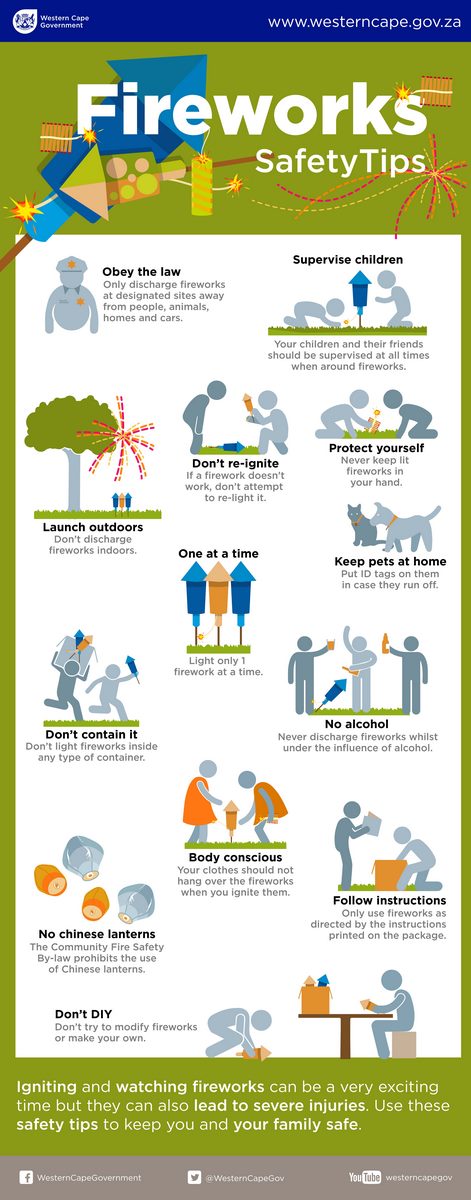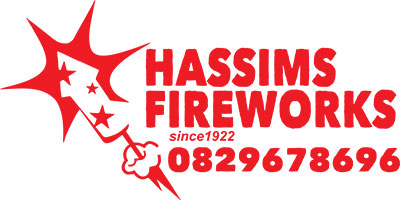Hassim's have been supplying fireworks to the public for many decades, we are fireworks experts supplying fireworks to the public and setting up special fireworks display projects for events of governmental and private organisations. We fulfill all technical and legal aspects of a successful fireworks display and advise the public on the compliance requirements to safely and legally have a successful fireworks display at home. Please see the legal requirements of a fireworks display below:
 |
When you buy fireworks to use this festive season make sure that:
Animals are easily frightened by fireworks and can become distressed or try to escape and run away. So, we encourage you to keep an eye on your pets and to keep them safely indoors where possible. Firework safety tips:
FinesIn terms of Section 30 of the Explosives Act of 1956, the use or detonation of any fireworks in any building and public thoroughfare is liable to a R200 fine; selling fireworks to a child or anyone under the age of 16 is liable to a R300 fine; and allowing a child or person under the age of 16 to handle fireworks without adult supervision is liable to a R300 fine. Additional information:
In the event of an emergency:
If you have information relating to the illegal sale or use of fireworks, you can report it to the Metro Police Call Centre on 0860 POLICE (765423) or to SAPS on 10111. From New Year’s Eve to Guy Fawkes Day, for many, a celebration is incomplete without a good firework display. But before lighting up those crackers, it’s important to remember that it’s not just a free-for-all, and there are laws the regulate the use of fireworks in South Africa. Not complying with the rules could result in a hefty fine or time behind bars. It is worth noting that there are only a few specific days on which the public may set off fireworks (these include Diwali, New Year’s Eve and, of course, Guys Fawkes). The use of fireworks in South Africa is regulated by by-laws under the Explosives Act, 1956. Before we get into the general dos and don’ts, always check in with your local authorities to see if there aren’t specific by-laws that apply to your particular town or city. 9 Important Things to Know About Fireworks Laws in South Africa
Should you become aware of anyone not complying with the law, you can call the police and report them. And, if you are setting off fireworks, remember to be considerate and responsible. Fireworks and the Law in South AfricaRegulating Fireworks Fireworks are a common method to celebrate a new year, Diwali and less known celebrations such as guy fawkes day. Fireworks displays can be beautiful to look at, however, there are certain regulations when it comes to the handling of fireworks. The Explosives Act Fireworks in South Africa are controlled in terms of the Explosives Act 15 of 2003 (Explosives Act). There are also specific by-laws that regulate the use or exploding of fireworks. Firework dealers need to be licensed in terms of the Explosives Act. Only individuals in possession of valid licences may deal in the sale of fireworks. Municipal By-Laws eThekwini Municipality takes the Explosives Act very seriously. There are strict Municipal Bylaws when it comes to the use of fireworks. The unlawful use fireworks could see residents face fines of up to R10,000 (Ten Thousand Rands). The municipal bylaw allows for fireworks to be set off from 11.45pm on December 31 until 00.15am in the new year. There are conditions that residents need to adhere to. Low-hazard fireworks, such as fountains, lawn lights and sparkles, can be lit in private homes. Fireworks such as air bombs, supersonic bangs, sound shells, fountain whistles and screeches are prohibited as they cause a disturbance and are a nuisance to neighbours and pets. Minors and handling fireworks Minors are prohibited from handling explosives and this includes certain types of fireworks. Municipal bylaws also state that children under 16 years of age to be properly supervised by an adult when letting off fireworks. Areas where fireworks should not be exploded It is unlawful for any person to use or explode any firework within 500 metres of any building or any public thoroughfare. It is important to only buy legal fireworks and always check expiry dates on the fireworks. Fireworks should be detonated away from hospitals, clinics, old age/nursing homes, animal welfare organisations and petrol stations. Fireworks should not be pointed towards any person, as this is dangerous. Residents are also reminded that fireworks cannot be recycled and therefore they need to be disposed of appropriately, in black bin bags. |



